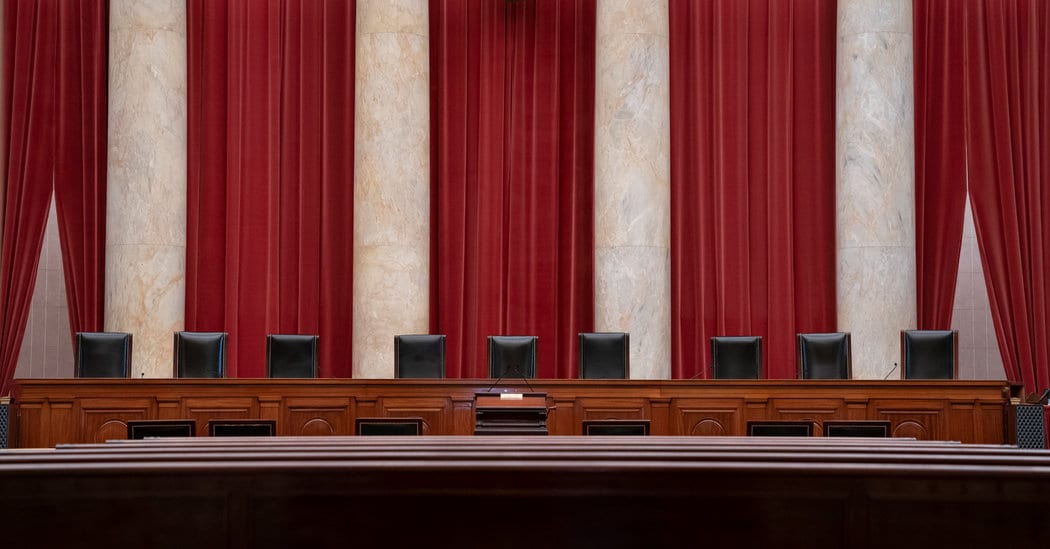[ad_1]
WASHINGTON — Chief Justice John G. Roberts Jr. played traffic cop. Justice Clarence Thomas asked his first questions in more than a year. Justice Sonia Sotomayor disappeared for a few moments, apparently having failed to unmute her phone.
On the whole, the Supreme Court’s first argument held by telephone went smoothly, with the justices asking short bursts of quick questions, one by one, in order of seniority, as the world, also for the first time, listened in.
The argument on Monday morning began with the traditional chant, “Oyez! Oyez! Oyez!,” said by Pamela Talkin, the marshal of the court. But that was almost the only traditional thing about it.
Chief Justice Roberts asked the first questions and then called on his colleagues. When lawyers gave extended answers, he cut them off and identified the next justice whose turn it was to ask questions.
The issue before the court was whether an online hotel reservation company, Booking.com, may trademark its name. Generic terms cannot be trademarked, and all concerned agreed that “booking,” standing alone, was generic. The question for the justices was whether the addition of “.com” changed the analysis.
Several of the justices suggested that the answer was yes. Justice Thomas asked how an internet domain name differed from an 800 phone number, noting that 1-800-PLUMBING is a registered trademark.
Other justices pursued his point.
“You can have a trademark that’s a telephone number,” said Justice Stephen G. Breyer. “So why can’t you have a trademark that’s a ‘.com’?”
An official of the Patent and Trademark Office rejected Booking.com’s application, and the Trademark Trial and Appeal Board affirmed that decision, saying the proposed trademark was generic. “Relevant customers,” the board said, “would understand the term Booking.com to refer to an online reservation service.”
A federal trial judge disagreed, ruling that the addition of “.com” to a generic term transformed it into “a descriptive mark eligible for protection.” A divided three-judge panel of the United States Court of Appeals for the Fourth Circuit, in Richmond, Va., affirmed that ruling.
In 1888, the Supreme Court decided a similar issue, ruling that the addition of “Company” or “Inc.” to a generic term like “wine,” “cotton” or “grain” did not create a protected trademark.
Erica L. Ross, a lawyer for the federal government, said that decision meant that Booking.com must lose. “Dot com is simply the online version of ‘company,’” she said.
“What respondent wants here,” she said, referring to the company, “is something it couldn’t get in the brick and mortar world.”
But Chief Justice Roberts said Booking.com was not a generic term, one describing what he called “a category of goods or services.”
“When you talk about other companies in that category, whether it’s Travelocity, Priceline or whatever, nobody refers to those as ‘Booking.coms,’” the chief justice said.
Lisa S. Blatt, a lawyer for Booking.com, argued that the Lanham Act, a 1946 law that codified trademark protections, repudiated the 1888 decision.
Chief Justice Roberts seemed sympathetic to that position. “It makes more sense to follow the language Congress chose in the statute,” he told Ms. Ross, “rather than a 130-year-old case of ours.”
Justice Samuel A. Alito Jr. said that was only a partial answer, as the 1946 law predated the digital era. “You are seeking,” he told Ms. Blatt, “a degree of monopoly power that no one could have had prior to the internet age.”
“I take it a company could not have registered ‘Booking Company,’ but because of the internet, you have Booking.com, which gives you an advantage over other companies that are in that business,” Justice Alito said. “And now you want to get even more advantage by getting trademark protection for that.”
Several other justices also asked about the possible harm to competition. Ms. Blatt said the concern was misplaced. “The notion that anyone is being crowded out is just silly,” she said.
Ms. Blatt said there were plenty of authentically generic domain names, reflecting on life during the pandemic. “I have searched every grocerystore.com looking for toilet paper,” she said. “I have now started looking at every hardware.com. I am using fooddelivery.com for all of my takeouts these days. Those are generic usages of a ‘generic-word.com.’”
Justice Breyer appeared unpersuaded. “You don’t have to worry about searching the internet for toilet paper from grocerystores.com,” he said. “There will only be one. Grocerystores.com will recognize one and only one. There will be pizza.com, there will be cookies.com, there will be flowers.com, etc.”
In their Supreme Court brief, lawyers for Booking.com listed countless trademarks made up of generic terms followed by “.com” that had been registered by the government.
“Seeking a date?” the brief asked. “Try Dating.com. Want to impress with concert tickets? Tickets.com or Concert.com can get them. Hoping for nice weather? Check Weather.com. Looking for the perfect dinner spot? Restaurant.com offers deals. Booking a flight to meet the parents? Flights.com can help.”
The passage went on in this way, listing more than a dozen other examples.
Justice Ruth Bader Ginsburg seemed concerned by the list. “How many already-registered marks would be subject to cancellation?” she asked Ms. Ross, who did not offer a direct response.
Supreme Court arguments typically last an hour. But Monday’s session went over by about 15 minutes, a consequence of the new format.


















